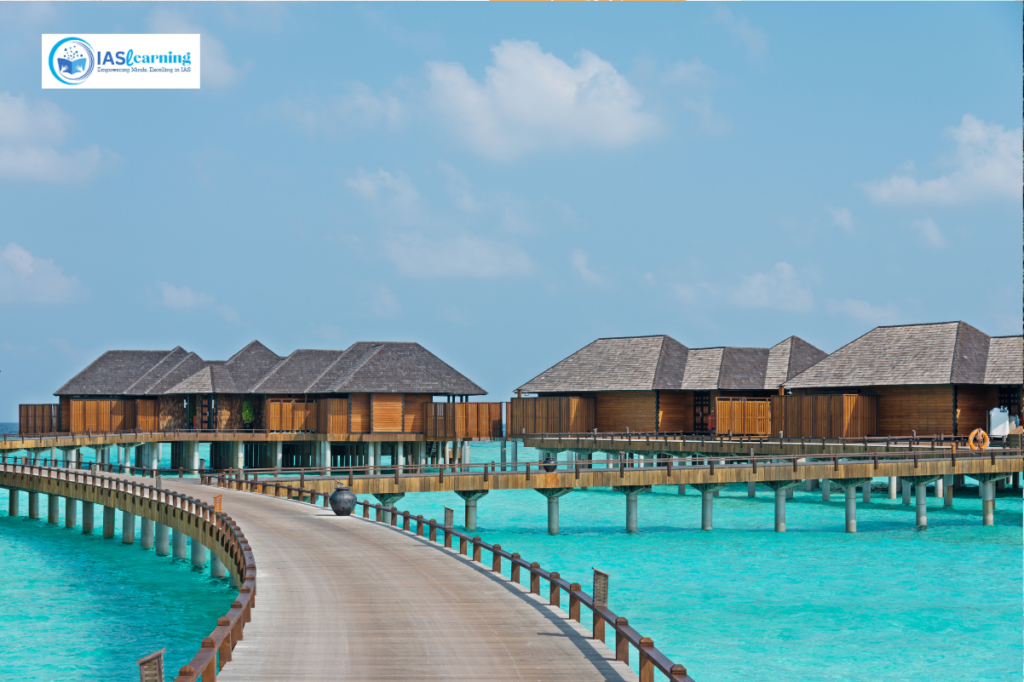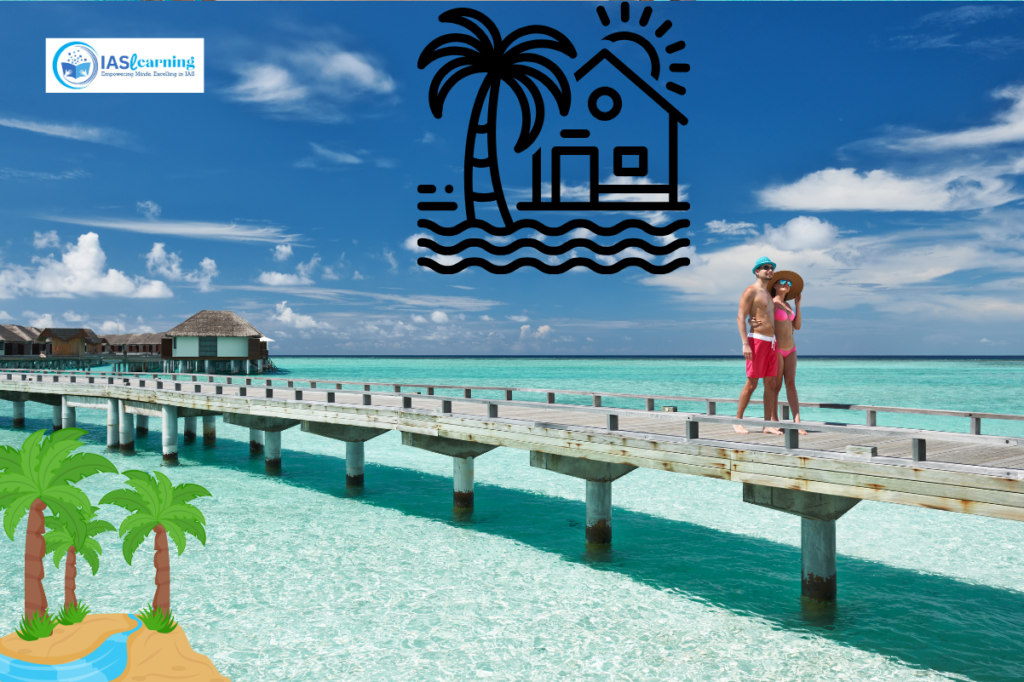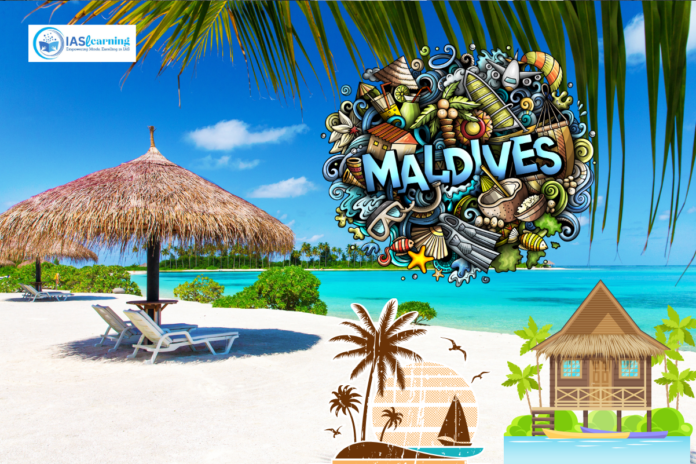International Relation#UPSC
Context: India-Maldives row
An online dispute that initially seemed unrelated to the India-Maldives escalated into a three-day conflict, eventually extending into the real world. This unexpected turn of events led to the summoning of the Maldivian envoy on Monday. The disagreement originated online and was seized upon by Maldivian politicians, despite its lack of direct relevance to the Maldives. This subsequently triggered a negative response from Indians, highlighting the potential for online conflicts to have real-world consequences. For the latest and most accurate information on this situation, it is advisable to consult reliable news sources, official government statements, or diplomatic channels, as geopolitical circumstances can evolve rapidly.

India-Maldives find themselves embroiled in a diplomatic conflict, the origins of which trace back to a social media altercation in cyberspace. This online dispute persisted for nearly three days before spilling over into the physical world. On Monday, January 8, India took a tangible step by summoning Maldivian High Commissioner Ibrahim Shaheeb, coinciding with the Indian envoy in Male engaging with Maldivian officials. The online battle began when some Maldivian politicians used abusive language in response to the promotion of Lakshadweep, a move perceived by the islanders as a threat to their tourism industry.
The controversy unfolded when Prime Minister Modi posted pictures from his visit to Lakshadweep on January 4.
The online backlash ensued immediately after the Prime Minister was seen engaging in snorkeling and relishing “moments of pure bliss” on one of Lakshadweep’s unspoiled beaches.
PM Modi shared images depicting leisurely walks on the white sands and moments of snorkeling, providing glimpses of coral reefs and marine life. He praised the island group as “a timeless legacy of traditions and a testament to the spirit of its people.”
This visit to Lakshadweep was part of Prime Minister Modi’s broader tour of South India, which included visits to Kerala and Tamil Nadu before reaching Lakshadweep. The online criticism, presumably from Maldivian politicians, emerged in response to what some perceived as a promotion of Lakshadweep that could potentially impact the tourism industry in the Maldives.

The adage “a picture is worth a thousand words” took on added significance as social media users began interpreting the nuances behind Prime Minister Modi’s images and statements during his Lakshadweep visit.
Numerous individuals on social media connected PM Modi’s reference to Lakshadweep as “India’s best-kept secret” and his time there to implications for the Maldives, potentially influenced by the Maldivian government’s warming relations with China. India, considering the Indian Ocean Region (IOR) as strategically vital, has expressed concerns about China’s presence and its ties with the new leadership in the Maldives. In the September elections, Mohamed Muizzu, perceived as leaning towards China, triumphed over the pro-India Ibrahim Mohamed Solih.
Despite reports and online discussions speculating on a India-Maldives connection to the promotion of Lakshadweep, New Delhi did not officially confirm any such link. Nevertheless, some politicians from the Maldives seized on the online discourse, resorting to abusive language directed at PM Modi and Indians in general.
HOW MALDIVIAN MINISTERS STARTED ANTI-INDIA ABUSES
The escalation of tensions involved Maldives Deputy Minister of Youth Empowerment, Mariyam Shiuna, who resorted to anti-India abuses on social media. In a series of posts, she referred to Prime Minister Narendra Modi as a “clown” and labeled him a “puppet of Israel” on X platform. Mariyam Shiuna persisted with her derogatory remarks across multiple posts.
Following a significant backlash, the minister eventually deleted her posts. This incident marked a notable development in the online spat, illustrating the impact of such exchanges on diplomatic relations and the subsequent need for damage control.

Maldivian MP Zahid Rameez became a prominent figure in the campaign to belittle India, asserting that India’s competition with the Maldives in the tourism sector was “delusional.” In a derogatory tone, Rameez went further, claiming there was a “permanent smell in the rooms” in India. He also accused India of imitating the economic strategies of smaller nations like Sri Lanka to generate revenue.
Rameez’s comments not only disparaged India but also offended the dignity of Indians. His assertion that India couldn’t match the Maldives in terms of service quality and cleanliness sparked widespread anger among Indians. This led to a massive online counter-offensive, with both celebrities and ordinary individuals joining forces to express their disapproval and defend India’s reputation.
HOW INDIAN CELEBS UNITED IN SHOW OF STRENGTH
In a powerful display of unity and support for their country, several Indian celebrities came together by Sunday (January 7) to encourage their fans to “explore Indian islands” as viable alternatives to the Maldives. Prominent figures such as Akshay Kumar, Salman Khan, Kangana Ranaut, John Abraham, and Shraddha Kapoor, among others, joined the movement.
Akshay Kumar, in a tweet, expressed the sentiment of many, saying, “…We are good to our neighbours but, Why should we tolerate such unprovoked hate? I’ve visited the Maldives many times and always praised it, but dignity first. Let us decide to #ExploreIndianIslands and support our own tourism.” Kumar emphasized that India sends the highest number of tourists to the Maldives, urging a shift in focus to domestic destinations. This united stand by Indian celebrities marked a notable response to the anti-India sentiment and aimed to redirect attention towards the beauty and attractions of Indian locales.

Ordinary Indians swiftly joined the resistance, utilizing hashtags such as #ExploreIndianIslands and #BoycottMaldives to counter the perceived “unprovoked hate” from Maldivians. Many individuals expressed their disapproval, indicating the cancellation of their plans for holidays in the Maldives in response to the derogatory remarks and the ensuing controversy.
By Sunday (January 7), the condemnation of the anti-India sentiments extended beyond social media, with Maldivian officials and former President Ibrahim Mohamed Solih expressing disapproval of the language used by Maldivian politicians. Solih took to social media, posting, “I condemn the use of hateful language against #India by Maldivian government officials on social media. India has always been a good friend to Maldives, and we must not allow such callous remarks to negatively impact the age-old friendship between our two countries.” This condemnation from a former President signaled an awareness of the potential harm such rhetoric could inflict on the longstanding friendship between the two nations.

